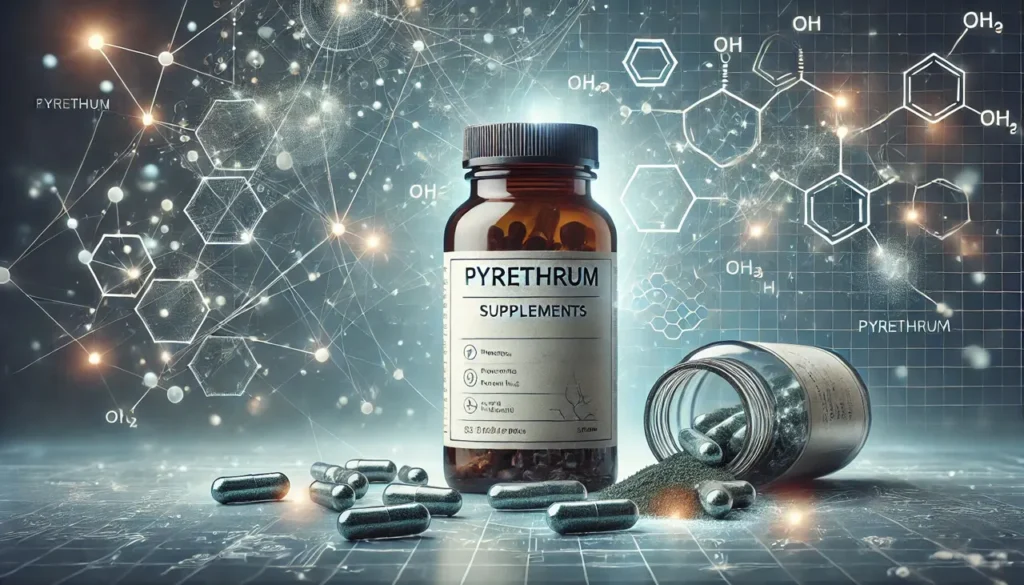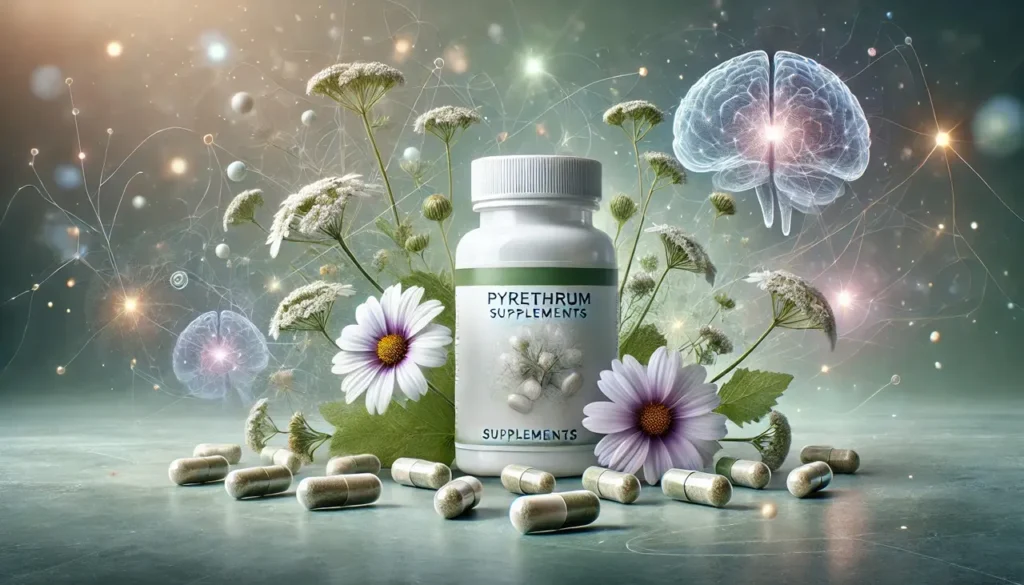Pyrethrum, derived from the dried flowers of Chrysanthemum cinerariifolium and related species, is widely recognized for its insecticidal properties. However, recent research has begun to explore its potential as a nootropic supplement, suggesting it may offer benefits for cognitive enhancement and overall brain health. This article delves into the chemistry, physiological mechanisms, potential nootropic benefits, appropriate dosages, side effects, interactions with medications and other supplements, and important considerations for safe use.
You May Also Like:
Emu Oil: Benefits, Dosage, Side Effects, Drug Interactions, and Other Important Information
Sources of Pyrethrum
Pyrethrum is predominantly sourced from the flower heads of the pyrethrum daisy, a plant native to East Africa. The two main types of pyrethrum, pyrethrin I and pyrethrin II, are responsible for its insecticidal effects. They act on the nervous system of insects, leading to paralysis and death. This has made pyrethrum a popular choice in agriculture and pest control. In addition to its use as a pesticide, pyrethrum is gaining attention for its potential cognitive benefits, leading to increased interest in its application as a dietary supplement.
Best Nootropic Supplements on Amazon for Boosting Brain Performance—Shop Now On Amazon!

Chemistry of Pyrethrum
The active components of pyrethrum, known as pyrethrins, are a complex mixture of esters, alcohols, and other organic compounds. Pyrethrin I and II are both esters formed from the reaction of chrysanthemic acid and a phenolic alcohol, with variations in their chemical structures that influence their biological activity. These compounds exhibit a lipophilic (fat-soluble) nature, allowing them to easily penetrate cell membranes and interact with biological systems.
Pyrethrins function primarily as neurotoxins, targeting sodium channels in neuronal membranes. They disrupt normal nerve signaling by prolonging the opening of these channels, leading to increased neuronal excitability. This mechanism is particularly effective against insects, but it also has implications for the mammalian nervous system. Emerging studies suggest that pyrethrins may possess antioxidant properties, potentially conferring protective effects against oxidative stress in neuronal tissues.

Physiological Mechanisms of Pyrethrum in the Body and Brain
Pyrethrum’s potential nootropic effects stem from its interactions with the nervous system, particularly its influence on neurotransmission and neuroprotection.
- Neurotransmitter Modulation: Pyrethrins may affect the release and uptake of various neurotransmitters, including gamma-aminobutyric acid (GABA), acetylcholine, and dopamine. By modulating these neurotransmitters, pyrethrins could enhance cognitive functions such as memory, attention, and learning. For example, the facilitation of GABAergic transmission may promote calming effects and reduce anxiety, indirectly supporting cognitive performance.
- Antioxidant Properties: The neuroprotective potential of pyrethrins is also attributed to their antioxidant effects. Oxidative stress is implicated in numerous neurodegenerative conditions, including Alzheimer’s and Parkinson’s diseases. By scavenging reactive oxygen species (ROS), pyrethrins could mitigate oxidative damage in neuronal cells, thereby protecting brain health and function.
- Neuroinflammation Reduction: Research indicates that pyrethrins may reduce neuroinflammation, a key factor in cognitive decline. Inflammatory processes can lead to neuronal damage and contribute to conditions like Alzheimer’s disease. By inhibiting inflammatory mediators, pyrethrins could help preserve cognitive function and enhance overall brain health.
Maximize Your Sleep Quality with Amazon’s Top Sleeping Supplements—Explore Now!
Nootropic Benefits of Pyrethrum
The exploration of pyrethrum as a nootropic supplement is still in its infancy; however, initial findings suggest several potential benefits worth considering:
- Cognitive Enhancement: Preliminary studies indicate that pyrethrins may improve cognitive function by enhancing neurotransmitter activity and promoting neuroprotection. This effect could manifest as improved memory, increased focus, and enhanced learning capabilities, making pyrethrum an intriguing candidate for cognitive support. Furthermore, by facilitating synaptic plasticity—the brain’s ability to adapt and reorganize—pyrethrins might help optimize learning processes and memory retention. As research continues to explore these potential mechanisms, pyrethrum may emerge as a natural supplement for individuals seeking to boost their mental performance.
- Anxiolytic Effects: The ability of pyrethrins to influence GABAergic transmission may confer anxiolytic properties, helping to alleviate anxiety and stress. By creating a calmer mental state, pyrethrum could indirectly support cognitive performance, especially under conditions of high stress or anxiety. Additionally, reducing anxiety levels may foster a more conducive environment for effective learning and memory formation, as stress often impairs cognitive processes. Continued research could further elucidate the specific pathways through which pyrethrins exert their calming effects, potentially leading to innovative therapeutic applications for anxiety disorders.
- Neuroprotection: Pyrethrum’s antioxidant and anti-inflammatory properties suggest it may play a role in protecting against age-related cognitive decline. By reducing oxidative stress and neuroinflammation, pyrethrins may help preserve cognitive function over time. In particular, the ability to scavenge free radicals and inhibit pro-inflammatory cytokines could contribute to a healthier neural environment, thus delaying the onset of cognitive impairment associated with aging. Understanding the precise mechanisms underlying these neuroprotective effects could inform strategies to maintain cognitive health throughout the lifespan.
- Potential Benefits in Neurodegenerative Conditions: Emerging evidence suggests that pyrethrum could be beneficial in managing symptoms of neurodegenerative disorders. While more research is necessary, its neuroprotective effects may hold promise for individuals with conditions like Alzheimer’s or Parkinson’s disease. Initial studies have indicated that pyrethrins might help mitigate the progression of neurodegeneration by protecting neurons from damage and enhancing cellular repair mechanisms. As researchers explore these avenues, pyrethrum could potentially become an adjunctive treatment option for supporting patients facing the challenges of these debilitating diseases.
- Mood Enhancement: Pyrethrins may also influence mood regulation, potentially leading to an uplift in overall emotional well-being. By modulating neurotransmitter systems such as serotonin and dopamine, pyrethrum could help alleviate symptoms of depression and improve mood stability. The enhancement of mood not only contributes to better emotional health but may also facilitate greater engagement in cognitive tasks, thereby improving overall quality of life. Further studies are warranted to explore the specific mood-enhancing mechanisms of pyrethrins and their implications for mental health treatments.
- Support for Sleep Quality: Another potential benefit of pyrethrins is their ability to promote better sleep quality, which is essential for cognitive health. By reducing anxiety and inducing a state of relaxation, pyrethrins may help individuals fall asleep more easily and maintain deeper sleep cycles. Improved sleep may have a cascading effect on cognitive functions, including memory consolidation and information retention, making it crucial for overall cognitive performance. As research continues to assess the relationship between pyrethrins and sleep, their role in sleep health could offer valuable insights for enhancing cognitive function through improved rest.

Dosage and Supplementation Guidelines
Currently, there are no established guidelines for pyrethrum supplementation as a nootropic. However, based on the available literature and traditional uses, the following dosage recommendations may be considered:
- General Dosage: For cognitive enhancement and general health, doses ranging from 100 to 300 mg of pyrethrum extract per day may be appropriate. This range may provide benefits without exceeding safety thresholds.
- Formulation: Pyrethrum is available in various forms, including capsules, powders, and tinctures. When selecting a supplement, it is essential to choose a product that contains standardized pyrethrin content to ensure consistency and efficacy.
- Consultation with Healthcare Professionals: Given the variability in individual responses and the lack of comprehensive clinical studies, consulting with a healthcare provider before starting pyrethrum supplementation is recommended. This is particularly important for individuals with pre-existing health conditions or those taking other medications.
Transform Your Mood and Reduce Stress with Amazon’s Best Supplements—Find Out More!

Side Effects and Safety
While pyrethrum is generally considered safe when used as directed, potential side effects may occur. These include:
- Gastrointestinal Distress: Some individuals may experience mild gastrointestinal symptoms, such as nausea, diarrhea, or stomach discomfort. These effects are usually transient and can often be mitigated by taking the supplement with food.
- Allergic Reactions: Allergic reactions to pyrethrum are possible, particularly in individuals sensitive to chrysanthemums or related plants. Symptoms may include skin rashes, itching, or respiratory issues. Individuals with known sensitivities should exercise caution when using pyrethrum.
- Neurological Effects: Given its neurotoxic properties, excessive doses of pyrethrum may lead to overstimulation of the nervous system. This could manifest as headaches, dizziness, or increased anxiety. Adhering to recommended dosages could help minimize these risks.
Interactions with Other Supplements and Medications
Pyrethrum may interact with various medications and supplements, which can alter their efficacy or increase the risk of adverse effects:
- CNS Depressants: When taken alongside central nervous system (CNS) depressants, such as benzodiazepines or alcohol, pyrethrum could potentially enhance sedative effects, leading to increased drowsiness or impaired coordination. Caution is advised when combining these substances.
- Stimulants: Pyrethrum may counteract the effects of stimulant medications, including those used to treat attention deficit hyperactivity disorder (ADHD). Individuals on stimulant medications should consult a healthcare provider before combining them with pyrethrum.
- Other Nootropics: While there is potential for synergistic effects with other nootropics, such as caffeine or L-theanine, careful monitoring is recommended. The combination of multiple cognitive enhancers could lead to overstimulation, resulting in side effects such as anxiety or jitteriness.
Risks for Individuals with Certain Health Conditions
While pyrethrum may offer benefits, individuals with specific health conditions should exercise caution:
- Neurological Disorders: Those with pre-existing neurological conditions, such as epilepsy or multiple sclerosis, should consult with a healthcare provider before using pyrethrum. Its neurotoxic properties may exacerbate certain conditions.
- Pregnancy and Breastfeeding: The safety of pyrethrum during pregnancy and lactation has not been established. Pregnant or breastfeeding individuals should avoid pyrethrum unless directed by a healthcare professional.
- Allergies and Asthma: Individuals with known allergies to chrysanthemums or related plants may experience heightened sensitivity to pyrethrum. Asthma sufferers should also exercise caution, as exposure to pyrethrum may trigger respiratory symptoms.
Amazon’s Essential Multivitamins for Physical and Mental Wellness—Discover More!

Should You Consider Pyrethrum as a Nootropic?
Pyrethrum presents a unique profile as a potential nootropic supplement, characterized by its neuroprotective properties, ability to enhance neurotransmitter function, and possible cognitive benefits. While preliminary evidence is promising, further research is needed to establish its efficacy and safety as a nootropic.
Individuals considering pyrethrum supplementation should approach it with caution, particularly in the context of existing health conditions or concurrent medications. Consulting a healthcare provider is essential to ensure safe and effective use. As research continues to unveil the complexities of pyrethrum and its potential role in cognitive enhancement, it may become a valuable addition to the nootropic landscape, offering a natural approach to supporting brain health and function.
In summary, pyrethrum stands at the intersection of traditional herbal use and modern cognitive enhancement. By maintaining awareness of its properties, benefits, and risks, individuals can make informed decisions regarding its use as a nootropic supplement.

References:
- Pyrethrum flowers and pyrethroid insecticides. Retrieved from: https://ehp.niehs.nih.gov/doi/abs/10.1289/ehp.8034189
- Chapter 39 – Pyrethrins and Pyrethroids. Retrieved from: https://www.sciencedirect.com/science/article/abs/pii/B9780128114100000398
- Neurobehavioral toxicology of pyrethroid insecticides in adult animals: A critical review. Retrieved from: https://www.sciencedirect.com/science/article/abs/pii/S089203620700356X
Important Note: The information contained in this article is for general informational purposes only, and should not be construed as health or medical advice, nor is it intended to diagnose, prevent, treat, or cure any disease or health condition. Before embarking on any diet, fitness regimen, or program of nutritional supplementation, it is advisable to consult your healthcare professional in order to determine its safety and probable efficacy in terms of your individual state of health.
Regarding Nutritional Supplements Or Other Non-Prescription Health Products: If any nutritional supplements or other non-prescription health products are mentioned in the foregoing article, any claims or statements made about them have not been evaluated by the U.S. Food and Drug Administration, and such nutritional supplements or other health products are not intended to diagnose, treat, cure, or prevent any disease.


